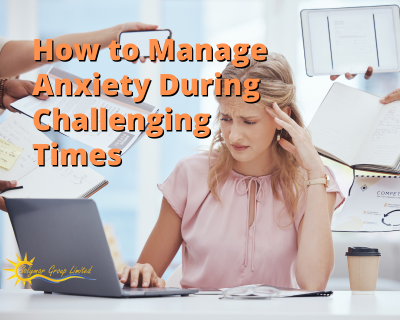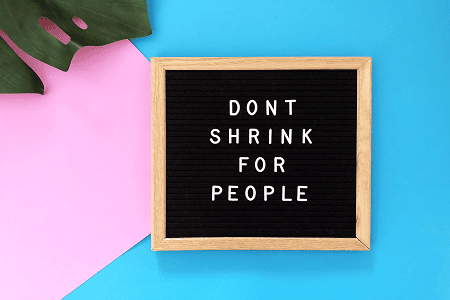 In today's fast-paced world, it's not uncommon for people to experience anxiety, especially during challenging times. Anxiety is a normal emotional response to stress, but when it becomes overwhelming, it can affect a person's mental health and well-being. Therefore, it's important to learn how to manage anxiety during challenging times.
In today's fast-paced world, it's not uncommon for people to experience anxiety, especially during challenging times. Anxiety is a normal emotional response to stress, but when it becomes overwhelming, it can affect a person's mental health and well-being. Therefore, it's important to learn how to manage anxiety during challenging times.
Understanding Anxiety
Before we discuss how to manage anxiety, it's important to understand what anxiety is. Anxiety is a natural response to stress and can manifest in physical symptoms such as rapid heartbeat, sweating, and muscle tension, as well as psychological symptoms such as excessive worrying and fear. Anxiety becomes problematic when it starts to interfere with daily life, preventing individuals from carrying out their daily tasks and routines. In some cases, anxiety can lead to panic attacks, which are sudden and intense episodes of fear and anxiety.
Managing Anxiety with Self-Care
Self-care practices can be effective in managing anxiety. One of the most effective ways to manage anxiety is through exercise. Exercise can help reduce tension and release endorphins that improve mood. Regular exercise can also help regulate sleep patterns, which can be disrupted by anxiety. It's recommended to engage in at least 30 minutes of moderate-intensity exercise most days of the week.
Relaxation techniques can also help calm the mind and reduce anxiety. Deep breathing exercises, meditation, and yoga can help reduce stress and anxiety by promoting relaxation and reducing muscle tension. Mindfulness, which involves being present in the moment and focusing on the present, can help prevent anxious thoughts from taking over.
Managing Anxiety with Cognitive Strategies
Cognitive strategies can help manage anxiety by challenging negative thoughts and replacing them with positive ones. This involves identifying and questioning negative self-talk and replacing it with more realistic and positive thoughts. Practising gratitude can also help reframe negative thinking patterns and promote positivity. When anxiety is causing negative thoughts, it is important to examine the evidence supporting these thoughts and challenge their validity. By doing so, you may find that the thoughts are based on assumptions or negative beliefs that are not accurate.
Managing Anxiety with Behavioural Strategies
Behavioural strategies can also help manage anxiety. Setting boundaries can help reduce stress and prevent anxiety from escalating. This involves saying no to commitments that are not essential and prioritizing self-care. Time management strategies can also help reduce stress and anxiety by providing structure and reducing procrastination. For instance, breaking down big tasks into smaller ones and tackling them one at a time can help reduce anxiety associated with feeling overwhelmed.
Seeking Professional Help
Sometimes, self-help strategies may not be enough to manage anxiety. Seeking professional help, such as therapy or medication, can be effective in managing anxiety. Cognitive-behavioural therapy (CBT) is a common form of therapy that can help individuals identify and challenge negative thinking patterns. It is a short-term, goal-oriented therapy that helps people develop coping strategies and change their behaviour.
Medication, such as antidepressants and anti-anxiety medications, can also be effective in managing anxiety, but should be prescribed by a healthcare professional. It's important to note that medication should not be the first line of treatment for anxiety, and it should only be used in combination with therapy or other self-help strategies.
Coping with Anxiety Triggers
Identifying and managing anxiety triggers can help prevent anxiety from escalating. Common anxiety triggers include social situations, news media, and work-related stress. Strategies for managing anxiety triggers include limiting exposure to triggering situations and practising relaxation techniques. For instance, if you find that watching the news is causing anxiety, you can limit your exposure to news media by only checking the news once a day or avoiding it altogether. Additionally, developing healthy coping mechanisms can help in managing anxiety triggers, such as taking deep breaths, taking a walk, or talking to a trusted friend or family member.
Conclusion
In conclusion, anxiety is a normal emotional response to stress, but it can become problematic when it starts to interfere with daily life. Managing anxiety during challenging times is important for mental health and well-being. Fortunately, there are various strategies that individuals can use to manage anxiety, including self-care practices, cognitive strategies, and behavioural strategies. Additionally, seeking professional help and coping with anxiety triggers can also be helpful in managing anxiety.
It's important to remember that everyone's experience with anxiety is different, and what works for one person may not work for another. Therefore, it's essential to find what works best for oneself and to seek help when needed. By prioritizing self-care and using effective strategies to manage anxiety, individuals can reduce the impact of anxiety on their lives and improve their overall well-being.
Hashtags: #AnxietyManagement #MentalHealth #SelfCare #CognitiveStrategies #BehaviouralStrategies #ProfessionalHelp #AnxietyTriggers #RelaxationTechniques #Gratitude #TimeManagement #CBT #DeepBreathing #Meditation #Yoga #Mindfulness #Exercise






